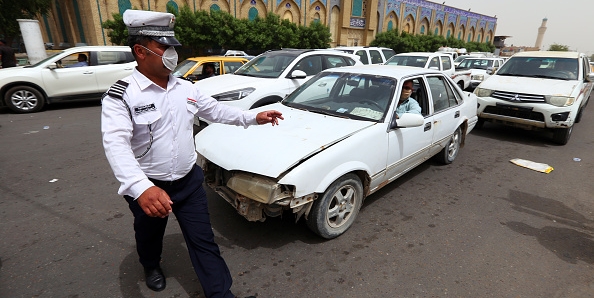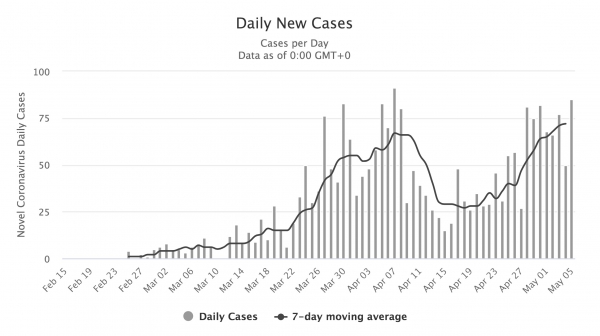Iraq eases pandemic lockdown despite second spike in new cases
With some measures relaxed, the risk of further COVID-19 case growth raises concerns.
The Iraqi government and the semi-autonomous Kurdistan Regional Government (KRG) are relaxing their strict anti-pandemic lockdown, despite fears of a second wave of infections, as border crossings with Iran re-open.
The measures to combat the spread of COVID-19 were put in place more than two months ago. These measures included airport and border closures, strict curfews, and significant modifications to oil worker shifts.
Prime Minister Adil Abd al-Mahdi began the process of loosening restrictions during an April 19 videoconference meeting of the Supreme National Health and Safety Committee. Even as he announced the beginning of loosening restrictions, the embattled prime minister exhorted citizens to remain vigilant.
Public statistics from Iraq's Ministry of Health show a peak of 91 new cases reported on April 7, with the daily rate of diagnosed infections dropping to 15 on April 15, before steadily rising again, to a recent peak of 82 on April 30.
The numbers indicate a slow-down in the rate of new infections after the lockdown measures were implemented, and an increase as the restrictions have been eased.

Source: https://www.worldometers.info/coronavirus/country/iraq/
“We are still very scared,” a senior Iraqi government official in Baghdad said, suggesting the official figures could be artificially low due to Iraq’s limited testing capacity.
On May 6, Iraq’s Ministry of Health said there have been 2,480 confirmed cases of COVID-19 in Iraq, with 102 resulting in death and 1,602 people who have recovered from the virus.
In Basra, most roads were reopened to vehicle traffic two weeks ago, with the exception of the Shatt al-Arab and Medina districts, which were kept under curfew because of a high reported rate of virus cases. One week after the easing of lockdown restrictions, medical officials in Basra reported 47 new cases of COVID-19 in the province.
In response, Basra Operations Commander Lt. Gen. Qassim Nazal called on citizens to adhere to the remaining curfew restrictions and stay at home.
Abd al-Mahdi's health and safety committee ordered the lifting of the daytime curfew for the holy month of Ramadan. The curfew will now run from 7 p.m. to 6 a.m. every night until Friday, May 22. Fridays and Saturdays will remain under full curfew.
Large gatherings, schools, universities, places of worship, stadiums, cafes and malls will remain closed. Restaurants can only offer delivery services, and factories and government offices must operate with a minimum workforce, the committee said.
Internal and exterior travel among provinces remains banned, with some exceptions, including for commercial trucks. Gov. Ali Dawai of Missan province said in a statement on April 23 that cargo goods and construction materials should be allowed to enter his province through all checkpoints, due to a recent shortage of construction and building materials.
In Erbil, the capital of the Kurdistan region, the main bazaar and other shops reopened on April 24 when authorities lifted the daytime curfew. In Sulaimaniya, some shops and popular cafes have reopened. A ban on traveling between Kurdistan's provinces remains in place.
On May 1, the KRG Interior Ministry announced the extension of the nighttime lockdown between 6 p.m. until midnight, until May 10. As of now, universities are slated to reopen on May 16.
The KRG has also relaxed border restrictions with Iran, which were put in place when Iran's coronavirus caseload exploded. During the lockdown period, only the formal border crossings of Parwezkhan, Bashmakh and Haji Omran remained open to commercial traffic only. In recent days, a number of informal border crossings also used for commercial purposes have reopened. The borders have been re-opened under the condition that strict health measures remain in place, according to customs officials.
Jawdet Zamil reported from Missan. Iraqi staff reporting from Nassiriya are anonymous for their security. Jassim al-Jabiri reported from Basra. Mohammed Hussein reported from Sulaimaniya. Rawaz Tahir reported from Erbil. Cathy Otten reported from the United Kingdom.





